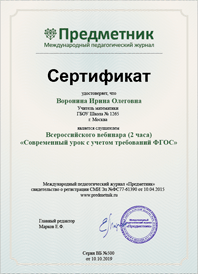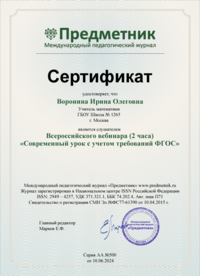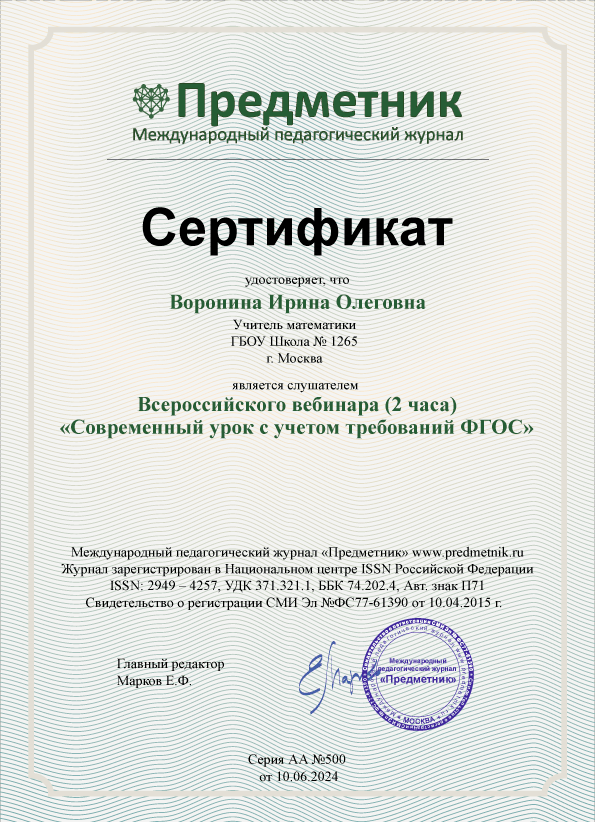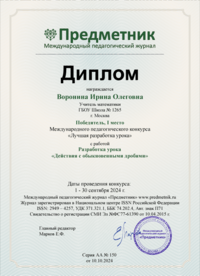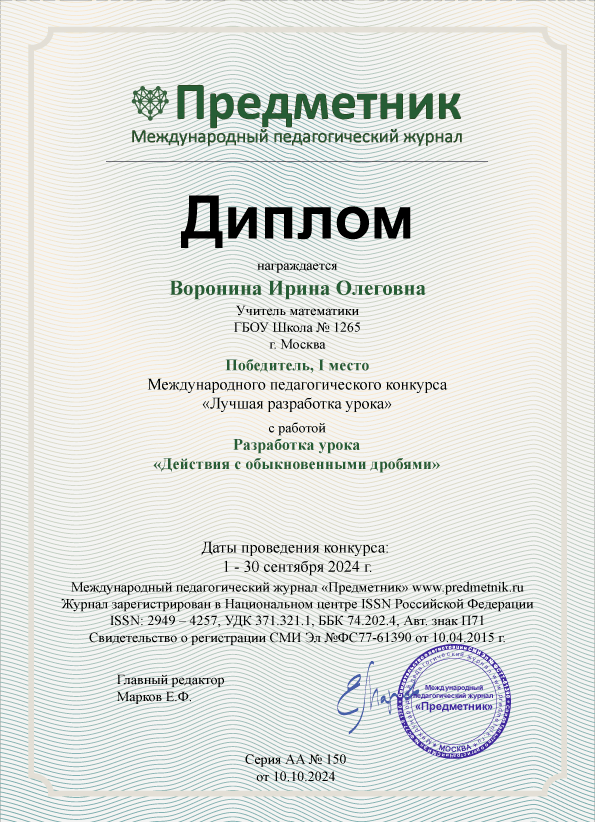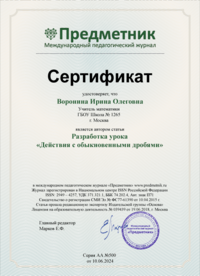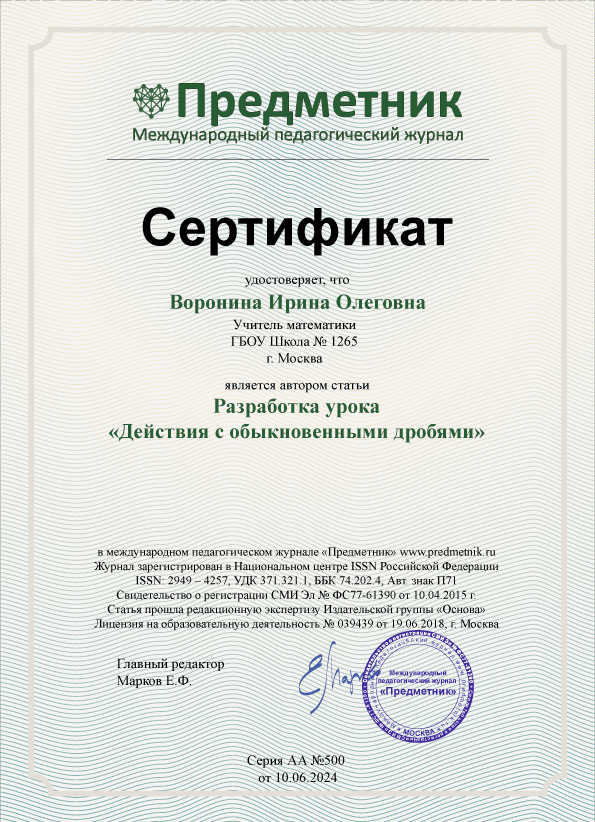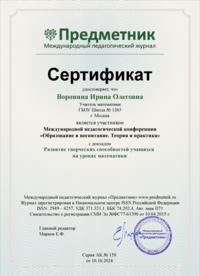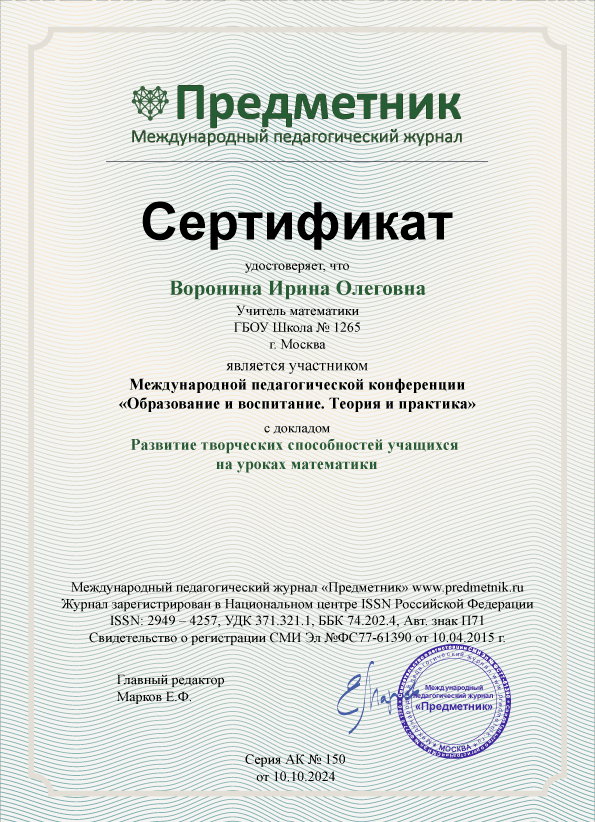Use of educational games for teaching vocabulary
Автор: Белова Владислава Николаевна
Организация: МАОУ Школа № 55
Населенный пункт: Нижегородская область, г. Нижний Новгород
Annotation
Games and games-based learning have been a part of education for decades. Nowadays, the idea of using games in teaching process seems to be widely accepted everywhere as their profitability and necessity have been proposed and justified since the seventeenth century by such famous linguist as Comenius. Today more and more teachers believe that games help their students to feel more relaxed, express their thoughts and share different ideas in English forgetting about their fear of making mistakes. There are different types of games, which can be used by a teacher during the lesson for different purposes, but in this article we are going to examine educational games and their use for teaching vocabulary in English to students.
Use of educational games for teaching vocabulary
Educational games allow students to practice all their integrated skills, however, vocabulary is influenced most of all. It is obvious, that vocabulary plays a huge role in language learning, but students usually find memorizing new words boring and time-demanding. So, appropriately chosen and used vocabulary games make the process of enlarging students’ vocabulary much easier and more pleasant for both learners and a teacher.
According to Michael J. Wallace: “The basic aims of vocabulary games and vocabulary exercises are very similar: to develop students’ vocabulary, perhaps by extending students’ vocabulary or perhaps by giving students practice in using what students already know and so on. In a vocabulary game there will be the additional aim of adding some fun, relaxation, enjoyment to the lesson” (p.106). It is obvious that a teacher, whose English lessons include different vocabulary games can help his or her students practise all language skills and memorise new vocabulary much easier.
Advantages and disadvantages of using educational games for teaching vocabulary
It is important to remember that use of educational games for teaching vocabulary has their own advantages and disadvantages, which should be taken into consideration.
The main advantages of educational games for teaching vocabulary can be summarized as follows (Thornbury 2004; McCarthy 1992; Gairns and Redman 1992):
1 - One of the most important reasons for using vocabulary games in the classroom is that they create a relaxed atmosphere at the lesson. Demes da Cruz also states (2008, p.18): ‘While playing language games, students can be exposed to the target structures. However, because this is done in a context of a game, they relax and forget that they are being watched. They often become so involved in the game that they stop feeling anxious about their mistakes.’ So, students have fun learning new words, practicing and improving their skills as they start forgetting about their shyness and fear of making errors.
2 - A teacher can use vocabulary games as a testing mechanism, because they easily expose students’ weaknesses, which need to be remediated. For instance, a teacher can mention that his or her students have difficulties using the words related to the topic “Education”, so he or she can bring some material in order to revise this topic during the next lesson.
3 - As playing games has always been a natural and vital part of growing up and learning processes, use of vocabulary games enables students to make their own experiments, discover different approaches, which are suitable for them while learning a new language and interact with their peers practising new vocabulary.
4 - As Hill (1990) pointed out educational games for teaching vocabulary allow a teacher to add variety to the range of learning situations. In particular, with a help of games a teacher can make his or her lesson more interesting for students and involve them in a learning process without any additional effort, as everyone adores playing because it is a kind of break for a brain.
5 - Educational games intended to enlarging students’ vocabulary can be successfully used to change the pace of a lesson and renew students’ energy after teaching long formal units and before returning to very complicated topics.
6 - Vocabulary games usually provide students with “hidden” practice of new vocabulary, although students are not aware of this. For such effect, a teacher should choose educational games, which are connected with the topic that students have covered during the lesson in order to drill new words and imprint them on students’ minds (Hill 1990: 2)
7 - Cooperative educational games for teaching vocabulary encourage students to participate in the learning process removing the inhibitions of students who feel frightened and lack confidence in formal classroom situations. In a process of a game student-student communication usually increases, and therefore the domination of a teacher partially reduces. So, while playing a teacher changes his or her role for students becoming an organizer of exciting activities that they enjoy participating in instead of being a strict formal instructor.
8 - Playing educational games at the end of the lesson helps students to relax after studying hard and feel less tired. So, they leave the classroom with great satisfaction and positive emotions, which makes them come to their next lessons and study diligently doing all tasks that a teacher gives to them, especially if he or she motivates them by promising to play a new game after doing and checking all the exercises. It can serve as an excellent way of not only motivating them, but also stimulating them to learn vocabulary (McCarthy 1992: 115).
The principles of choosing and ways of using educational games
At the same time, overuse of games can have some negative consequences for both students and a teacher. In fact, having been carried away by a game many students can forget about time, and it will be extremely difficult for a teacher to persuade them to stop playing and return to more serious studying process. So, In
order to make students learn vocabulary more successfully and effectively a teacher should work hard at selection of vocabulary games taking into consideration the main factors, which may influence the effect of these games on the learning process.
Having considered all factors and chosen an appropriate vocabulary game, a teacher should prepare and organize all needed materials thoroughly to make this game be good fun. In addition, before using the game it is very important for a teacher to make sure that all necessary facilities such as laptop, projector and speakers are available in the classroom.
A teacher should give very clear instructions before and during a game in order not to make students confused. It is sometimes appropriate to give instructions in mother tongue if there are students, who have difficulty understanding English (Tomlinson, Brian & Masuhara, Hitomi (2009)). Also, wherever it is possible, a teacher should try to demonstrate students what they are going to do. If it is necessary, a teacher can clarify any key language or instructions by writing them on the blackboard. Moreover, it is important to encourage students helping them to appreciate their own work and behavior while separating their work from their worth. So, a teacher should pay equal attention to each student and be able to point out some of their strengths or improvement, focusing on the specific behavior while playing with them.
Conclusion
To sum up, teaching ESL has changed a lot over the past years. Once, it was all about learners being passive and listening in the classroom, but today learners are more exacting, and it demands much more effort from a teacher to meet their needs. A more specific way that teachers can use in order to keep diversity within the classroom is using games as a teaching method along with other methods. In fact, educational games are especially fitting for all stages of language learning. Use of educational games enables a teacher to draw his or her students’ attention to the lesson and involve them in learning process. Due to the fact, use of educational games creates a relaxed atmosphere in the classroom, students feel free to express their thoughts, develop their integrated and transferable skills, participate more actively and enlarge their vocabulary. It is obvious, that vocabulary plays a huge role in language learning, but students usually find memorizing new words boring and time-demanding. So, appropriately chosen and used vocabulary games may make the process of enlarging students’ vocabulary much easier and more pleasant for both learners and a teacher.
Reference list:
- Lee Sukim. (2010). Creative games for the language class (Forum) vol.33No 1, January-March.
- Andrew Wright., David Betteridge., Michael Buckby. (2013). Games for language learning, (second edition). Cambridge university press.
- Khan, J. (2003). Comenius’ early primitive explanations of implementing Educational Games into classrooms: Using games in teaching English to young learners-Teaching English to children, from practice to principle, England, Longman.
- Avedon, M.E., B.S.Brian. (2012). Learning through Games. The Study of Games. New York: John Wiley & Sons.
- Byrne, D. (1995). Games. Teaching Oral English. Harlow: Longman Group UK Limited.
- Mulac, E.M. (1971). Educational Games for Fun. New York: Happer & Row, Publishers, Inc.
- Demas de Cruz., Richard-Amato, P., A. (1996). Making it happen. New York: Addison-Wesley Publishing Group.
- McDaniel, Tim. (2012). Language Games. Dept. of Foreign Languages, Faculty of Humanities and Social Sciences, KKU. (Unpublished).
- Harris, C. (2009). Meet the New School Board: Board games are back – and they’re exactly what your curriculum needs. School Library Journal.
- MacKenty, B. (2006). All Play and No Work. School Library Journal.
- Marzano, R. J. (2010). Using Games to Enhance Student Achievement. Meeting Students Where They Are.
- Okan, Z. (2003). Edutainment: is learning at risk?. British Journal of Educational Technology.
- Graham, A. (2012). Gamification: Where’s the fun in that? Retrieved from: http://search.proquest.com/docview/1220997160?accountid=13380.
- Aydan Ersoz. (2000). Six games for the EFL/ESL classroom. The internet TESL Journal, Vol.VI.
- The one stop magazine. (2014). Article: Teaching English using Games. The magazine for English Language Teachers.

